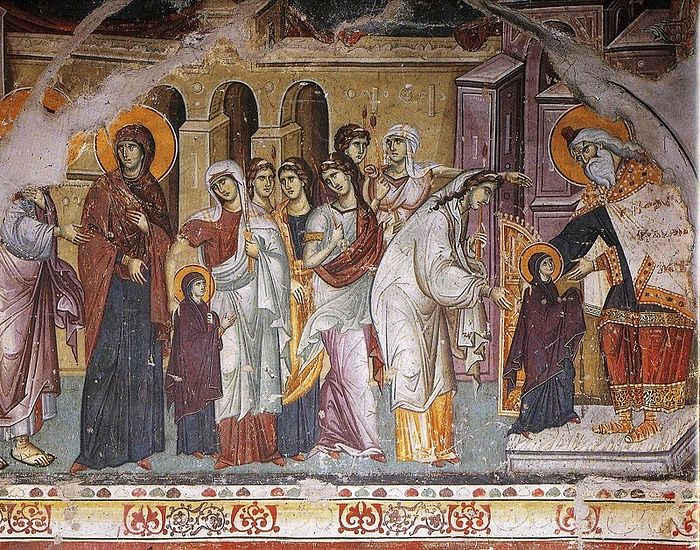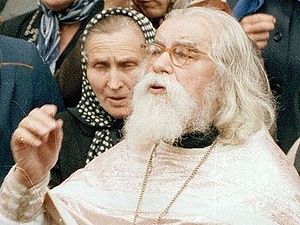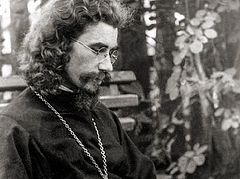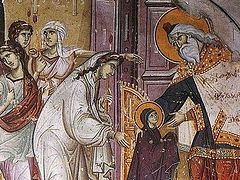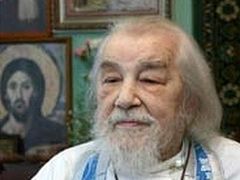In the name of the Father and of the Son and of the Holy Spirit!
Today the Virgin appears in the temple of God, in anticipation proclaiming Christ to all…
The angels beheld the entrance of the Pure One and were amazed. How has the Virgin entered into the Holy of Holies?
Purity and holiness, light and joy—that imperceptible spirit of today’s feast and service. Upon the steps of the Old Testament shrine of the Jerusalem Temple stands the three-year-old youth, the great Holy of Holies, triumphantly and rejoicing. And her elderly and righteous parents, Joachim and Anna, and a choir of young maidens with lighted candles, “singing, playing, and exalting,” accompany she who is borne as a gift to God. Embraced by sacred delight, the high priest Zacharias, the elder and father of the Forerunner, “blessed and welcomed” the holy maiden, and according to special revelation bore her into the Holy of Holies.
Small events, so why is this celebration so joyful, so memorable and significant? Why did this feast become one of the twelve? Because, my dears, the Entrance of the Most Pure Virgin into the Temple became a necessary component in God’s salvific providence for the world.
This event put an end to the centuries long alienation of man from God and his sojourn under slavery to sin.
The sanctuary of the Jerusalem Temple, where dwelt God and where He manifested His presence, inaccessible to all except one high priest, and even then but once a year, where he entered with the blood offering, bringing prayer for the sins of the people, is by Divine grace opened to the God-chosen maiden—the daughter of man. And the Most Holy Virgin is brought into the Holy of Holies, and, invisibly for the world, bears within herself a great offering, a new living offering—Christ—God and Man.
The Old Testament Temple of God accepted into itself the seed of new life, the divine maiden in whom will spiritually sprout and grow the New, saving Covenant of man with God. The Old Testament Temple of God took into itself the sacred Ark of the New Testament, the animate temple of the Savior, the precious bridal chamber and Virgin—the sacred treasury of the glory of God.
With the entrance into the Temple of the God-chosen maiden the time came when the grace of God would return to people, and they would draw near to God, as to the Heavenly Father, for the Son of God is the Son of the Virgin and grace proclaims the good news of reconciliation with God, and the entrance to Heaven is opened to all desiring it.
And with this entrance it was possible for the first time to pronounce the words: “Thine own of Thine own, we offer unto Thee…”
God’s gift to man—the Most Holy Virgin—the fruit of prayer of her elderly parents, and through her—Christ, returns mankind to God, as a gift to Him from man, as a favorable and fragrant sacrifice.
And with this entrance, in anticipation of the great changes in the world, it was possible for the first time to sing the words of joy and hope: “Christ is born, glorify Him; Christ is descended from Heaven, go forth to meet Him!”
With the entrance into the Temple of the Most Holy Theotokos is accomplished a miracle. Heaven united with earth, and eternity entered into time, hallowing it for eternity. “Today is the prelude of the good will of God, of the preaching of the salvation of mankind…”
How great is this day, singular and unrepeatable—the day of the beginning of the New Covenant with God on earth.
A few years remained before the appearance of Christ the Savior in the world, and the Temple of God was called amongst the utmost holiness and purity and Divine power to nurture and cultivate in those years the delicate, childlike pure soul of the divine maiden, filling her with the Godhead, and preparing her for the Divine Incarnation.
Day by day the Most Holy Virgin grew in bodily and spiritual strength in the Temple of God. The strength of soul of the Most Holy Virgin was formed, grew, and strengthened by angelic converse and prayer directed towards God, and labors for the sake of God.
Her bodily strength was supported by heavenly food, brought to her by the archangel. The high priest Zacharias, himself unable to daily enter into the Holy of Holies, with astonishment, disbelief, and fear heard the conversations of the Virgin with the archangel in the Sanctuary. And, finding nothing similar in the appearances of angels to other people, the high priest was confirmed in the thought that the time of the fulfillment of the universal expectation had arrived, and from the blessed one would come Salvation, from the bride—the Promised One, from the Virgin—God.
But Mary, nourished by Divine grace, having lost in the last years of her life in the Temple her sole attachment to this earth—her righteous parents, gave a vow to God—to preserve until the end of her life her virginity and to remain the handmaiden of the Lord, Him alone serving and devoting herself in all things and always to His holy will.
… Behold the handmaid of the Lord; be it unto me according to thy word (Lk. 1:38).
And her heart, given to God, became a temple not made by hands, a receptacle for God. And soon, very soon afterwards, Christ—Her Son and the Son of God—comes and establishes the legitimacy of this new temple not made by hands, the basis of which will be Himself.
Know ye not that ye are the temple of God, and that the Spirit of God dwelleth in you? If any man defile the temple of God, him shall God destroy; for the temple of God is holy, which temple ye are (1 Cor. 3:16-17). And with this renewal of the temple of God, people will worship God not only in Jerusalem, but in Spirit and in truth will they worship Him in every place of His dominion, wherever is found a faithful human heart that loves God.
For all of us on this great day of the present feast it is impossible not to ponder and understand that the path to Heaven, open to men in this time so far departed from us, all the same begins on the threshold of this temple of God not made by hands, when by Baptism man offers himself to God as a gift and becomes a temple not made by hands, and the Spirit of God takes up residency within Him. And our path in life must pass through the temple, to be reared and grow in it, that this path might end in the sanctuary of God, in Heaven, where with the offering of His own Blood has already entered Christ Himself—the High Priest of all future blessings.
My dears, the Temple of God always and at all times was an altar consecrated to God, and sacrifices brought by all. In the Old Testament times the Lord Himself blessed the Temple as a place of His dwelling: The heaven is my throne, and the earth is my footstool: where is the house that ye build unto me? and where is the place of my rest? (Is. 66:1).
And the first Temple of God—the sanctuary built on earth, erected by Solomon, the son of the king and prophet David, in the year 1033 before the Nativity of Christ, was created directly at God’s bidding. I have hallowed this house, which thou hast built, to put my name there for ever; and mine eyes and mine heart shall be there perpetually (3 Kg. 9:3). And wondrous and holy and magnificent was the first Temple of the Lord in Jerusalem, and the Ark of the Covenant, given to man by God, through Moses, was in it.
The Temple of God at all times is always eternity, in it lives and abides everything that was from the beginning, from the creation of the world, and what will be until the Second and glorious Coming of the Lord. In the Temple of God everything and always lives—the past, and the present, and the future. And there are not mysteries in life which the Temple of God—the Holy Church—does not know.
But why do the living not know these mysteries; why do even those who abide in the Temple remain deaf and blind to them; why do they see and hear so little?
Why was the first Jerusalem Temple, together with the great shrine, the Ark of the Old Covenant, lost? Why has that great shrine of the Second Jerusalem Temple, sanctified by the abiding there of the Ark of the New Covenant—the Most Holy Divine Maiden—and sanctified by the appearance there of our Savior and God—Christ, left us as a reminiscence nothing but the Wailing Wall? Why should the “New Israel”—Great Russia—throughout nine centuries creating within itself the House of God, like the Old Testament Israel suffer through the seventy-year captivity by their own and the abomination of desolation in the holy place—the many, many destroyed churches and monasteries of God?
We must seek again the answer to all our bitter “whys?” in the Church and in the Holy Scriptures, which the Church preserves. It preserves sacred objects, it preserves truth, but woe to us, the living, for these storehouses opened, these prophecies fulfilled before us, appearing for us because of our negligence, bitterness and secret unbelief as behind seven seals.
This is what the Lord of Sabaoth said when the first Old Testament Temple was newly consecrated. Listen to these words, my dears, spoken to all of mankind by the Lord as a warning:
But if ye shall at all turn from following me, ye or your children, and will not keep my commandments and my statutes which I have set before you, but go and serve other gods, and worship them: Then will I cut off Israel out of the land which I have given them; and this house, which I have hallowed for my name, will I cast out of my sight … And at this house, which is high, every one that passeth by it shall be astonished, and shall hiss; and they shall say, Why hath the Lord done thus unto this land, and to this house? And they shall answer, Because they forsook the Lord their God … and have taken hold upon other gods, and have worshipped them, and served them: therefore hath the Lord brought upon them all this evil (3 Kg. 9:6-9).
They to whom these words were addressed did not hear them. Will we really not hear them, seeing them fulfilled?
Falling away from God is the cause of all ills at all times.
The Jewish kings and people apostatized from God, worshiping strange gods. The Lord punished Israel with war, and in anticipation of repentance sent the prophet Jeremiah to the apostates preaching repentance unto correction. But they did not listen to the prophet, as they had not listened to the Lord Himself. And Jerusalem was destroyed, and Solomon’s Temple fell, and the Ark of the Covenant was lost, and the seventy-year Babylonian captivity was the lot of sinful Israel.
The Second Jerusalem Temple, built following the return from the Babylonian captivity, was smaller and not so magnificent, but the prophets Haggai and Zechariah prophesied that it would have greater glory than the first, for the Ark of the New Covenant would be nourished there. And the fate of this Temple and the discontinuation of Old Testament sacrifices were prophesied by the prophet Daniel long before their fulfillment. The final prophecy about the Second Jerusalem Temple sounded from the mouth of the Savior Himself. The Lord Jesus Christ wept on the day of His entrance into Jerusalem, and, seeing Golgotha near, foretold the destruction of the Temple: And shall lay thee even with the ground, and thy children within thee; and they shall not leave in thee one stone upon another; because thou knewest not the time of thy visitation (Lk. 19:44).
Rejected, again Israel rejected God, they rejected Christ the Savior Who took on humanity, condemned Him to death, and besought in His place Barabbas, a murderer. And finally, the world hears weeping and wailing for the blindness of the chosen people: O Jerusalem, Jerusalem, thou that killest the prophets, and stonest them which are sent unto thee, how often would I have gathered thy children together, even as a hen gathereth her chickens under her wings, and ye would not! Behold, your house is left unto you desolate (Mt. 23:37-38).
Your house is left unto you desolate—fearful words taking place, because people again did not want to be godly.
At one and the same time the Jerusalem Temple reared she who is the great Holy of Holies and the disciples of Christ, as well as those, who therein living their lives far from God, killed the high priest Zacharias between the Temple and the altar, killed the Forerunner of Christ John, and crucified Christ the Savior.
Do we not see that a man becomes either a co-worker with God, or a destroyer of that which the Lord creates? Look, my dears, how dangerously we walk. You can be in the Church but not have God, and God punishes people for dishonoring Him and rejecting the Church. God’s salvific punishments last decades, intended to return their human hearts to God. And as a final warning to us the words of the parable of the vinedressers sounds out: Therefore say I unto you, The kingdom of God shall be taken from you, and given to a nation bringing forth the fruits thereof (Mt. 21:43).
Let us be especially attentive, my dears, creating and restoring now in great quantity man-made churches, and not forget the most important New Testament church of God—our hearts, called to serve God in Spirit and in truth. Do not forget that we are returning from captivity amongst foreigners, and do not forget our countrymen who fight for us and our Orthodox faith, sick, lame, and spiritually depleted. We were without God for a long, long time and now stand but at the threshold of the Church, which will sanctify us, but under one condition: if we want it.
I will bring you, my dears, the words of the Lord, which especially now should help us comprehend the critical moments of our present life: “… therefore thus saith the Lord of hosts; Consider your ways. Ye have sown much, and bring in little; ye eat, but ye have not enough; ye drink, but ye are not filled with drink; ye clothe you, but there is none warm; and he that earneth wages earneth wages to put it into a bag with holes. Thus saith the Lord of hosts; Consider your ways. Go up to the mountain, and bring wood, and build the house; and I will take pleasure in it, and I will be glorified, saith the Lord. Ye looked for much, and, lo it came to little; and when ye brought it home, I did blow upon it.
Why?
saith the Lord of hosts. Because of mine house that is waste, and ye run every man unto his own house. Therefore the heaven over you is stayed from dew, and the earth is stayed from her fruit (Hag. 1:5-10).
We stand upon the threshold of the Church, and must enter in, having revived within ourselves knowledge of the law of God, to enter with the fulfillment of our vows already offered to God by us. And don’t forget, that rulers alone do not mete out the destinies of countries and peoples, but responsibility before God for the life of the world falls on all, on every living person, no matter how small.
My dears! The grace of God gives us the present time for repentance. The love of God endures the disease of our unbelief. The Lord waits to gather us under His wings. Let us desire salvation, return to the Church of God with love and desire for Him, and return to God the temple of our hearts, that the bounties of the grace of God, imprisoned by our sins, and Heaven may be opened.
The Most Holy Virgin, the God-chosen maiden, the daughter of man, the first to open Heaven to us, becoming the mother of suffering and ailing mankind, is always ready to support, strengthen and guide in life, along the path of salvation, by her grace all who flee to her with faith and love.
“We magnify thee, O most holy Virgin, God-chosen Maiden, and we honor thine entry into the temple of the Lord.” Amen.
Delivered on Nov.21/Dec. 4, 1994

